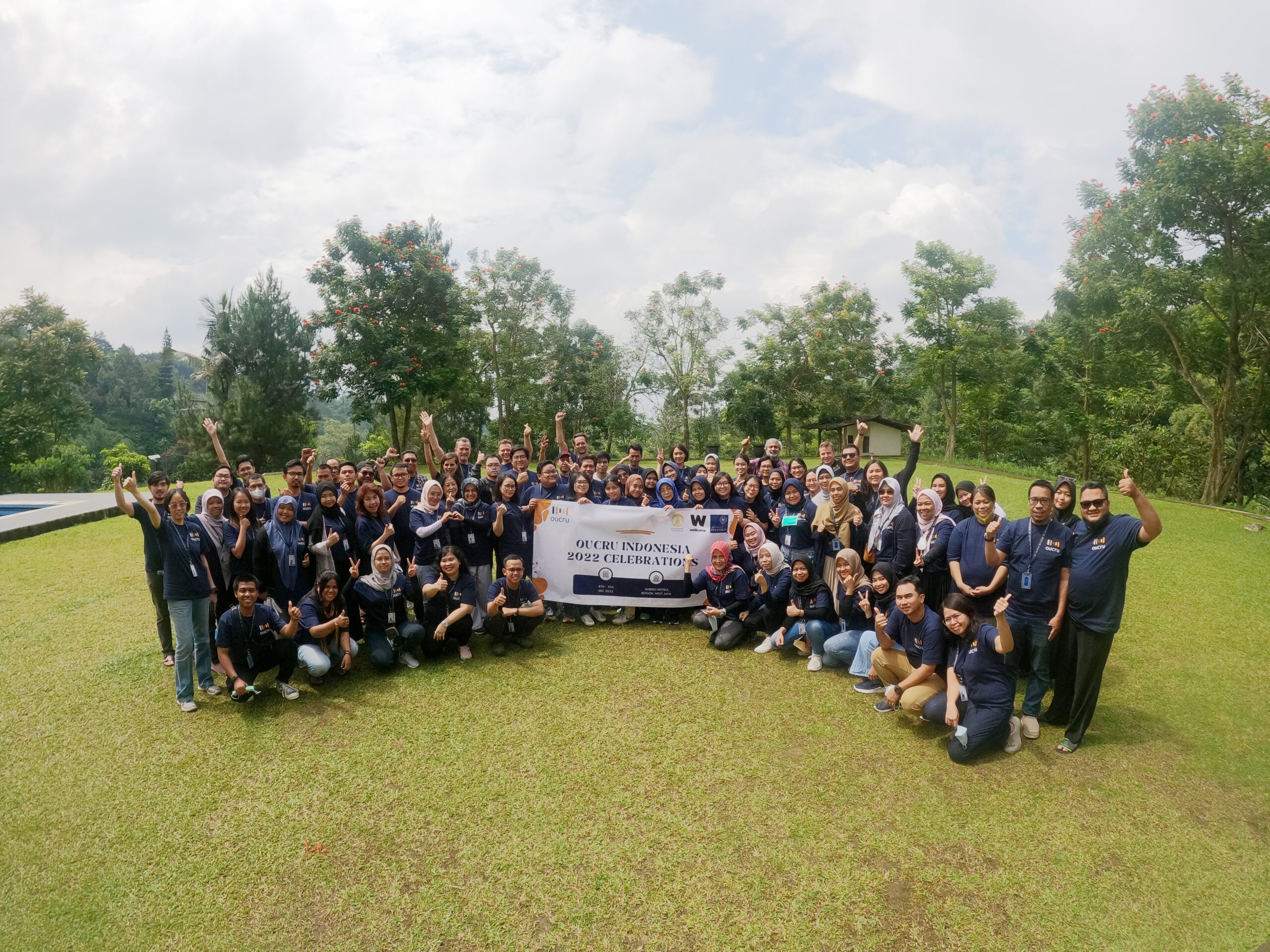
In 2008, the Eijkman-Oxford Clinical Research Unit (EOCRU) was established in Jakarta, Indonesia, in partnership with the Eijkman Institute for Molecular Biology and Faculty of Medicine, University of Indonesia. In 2022, EOCRU changed its name to OUCRU Indonesia, hosted by the Faculty of Medicine, University of Indonesia.
Through more broadly relevant and high-impact clinical research endeavours, OUCRU Indonesia deliberately cultivates technical capacities and people within Indonesia with the aim of fostering further independent clinical research. The direct access to patients suffering from tropical and neglected infectious diseases allows the collaborative efforts to deliver tangibly better health outcomes for them. Previous or ongoing research includes adjunctive dexamethasone therapy for TB meningitis patients living with HIV, hypnozoitocidal therapies for radical cure of Plasmodium vivax malaria, experimental live sporozoite vaccines against malaria, diagnostics for G6PD deficiency and CYP2D6 pharmacogenetics in connection with that therapy, mechanisms of primaquine hemolytic toxicity in G6PD-deficient patients, and assessment of automated malaria diagnostic instruments.
Additionally, this unit investigates the impact of population mobility on malaria importation risks by applying big data cellphone-based geospatial analysis, quantifying burdens of morbidity and mortality of infectious and non-infectious diseases in relation to geography, socio-demography, and poverty in Indonesia.
We work with partners at the University of North Sumatra at Medan, Hasanuddin University at Makassar, Udayana University at Bali, the National Malaria Control Programme, and the Health Directorate of the Indonesian Army in Jakarta. We work within two hospitals in Jakarta, CiptoMangunkusumo Hospital and PersahabatanHospital – each a teaching hospital affiliated with FMUI. We also work at remote hospitals, clinics, and villages at study sites on Sumatra, Java, Bali, Alor, and Sumba islands.
OUCRU Indonesia also collaborates regionally, with research activities in Cambodia, Nepal, and Pakistan, as well as routinely collaborating with the World Health Organization (WHO) in Geneva, Delhi (SEARO), Manila (WPRO), and Cairo (EMRO) on research and policy consultations. OUCRU Indonesia engages and organizes capacity strengthening in malaria diagnostics and surveillance services to 10 regional laboratories and 34 provinces in Indonesia with Global Fund and NMCP resource support.
OUCRU Indonesia has long focused on trials assessing the treatment of vivax malaria. Millions of cases of malaria occur in Indonesia each year, with about half of those caused by Plasmodium vivax. This species places dormant forms that awaken in people in the months following infection to cause repeated attacks of malaria. Arresting acute vivax malaria and preventing recurrent attacks requires treatment with two classes of drugs, one aimed at each. Assessing the safety and efficacy of the many possible combinations of such therapies ensures access to those treatments.
The therapeutics for Plasmodium vivax malaria include two problems of human genetics: 1) hemolytic toxicity of the drug called primaquine in patients with glucose-6-phosphate dehydrogenase (G6PD) deficiency; and 2) impaired metabolism of primaquine by natural polymorphism of cytochrome P-450 type 2D6 (CYP2D6). Primaquine is the only currently available drug effective against the dormant liver stages of P. vivax. Research at OUCRU Indonesia takes aim at both of these issues in terms of diagnostics and understanding molecular mechanisms of these problems in order to ensure patients with vivax malaria are safely and effectively treated every time.
Following the establishment of the Universities of Indonesia and Oxford Clinical Research Laboratory (IOCRL) in 2017, new areas of interest include central nervous system infections, tuberculosis, HIV and antimicrobial resistance. TB meningitis, the most serious form of tuberculosis in patients living with HIV, is common in Indonesia. A clinical trial of adjunctive dexamethasone therapy has been undertaken by OUCRU Indonesia and its partners in striving to improve the quality of life and survival of these patients. The global rise in drug-resistant infections, a consequence of antimicrobial usage and abuse, is one of the greatest public health challenges worldwide. In Indonesia, high-quality data on the burden and associated morbidity, mortality and economic cost of antimicrobial resistance are lacking. OUCRU Indonesia aims to systematically study antibiotic access and usage, which is vital for developing biomedical and social interventions to curb drug-resistant infections.
EOCRU changed its name to OUCRU Indonesia, hosted by the Faculty of Medicine, University of Indonesia.
OUCRU Indonesia and FMUI jointly created the Universities of Indonesia and Oxford Clinical Research Laboratory (IOCRL) within the FMUI Department of Parasitology, with the aim of expanding its clinical research activities.
Developed the clinical and laboratory evidence demonstrating the crucial importance of CYP2D6 polymorphisms to the therapeutic success of primaquine against dormant liver stages of P. vivax.
Played a leadership role in the creation of WHO’s Global Technical Strategy for Malaria Control and Elimination (2015) and its Technical Brief for the Control and Elimination of Plasmodium vivax.
Hosted the Fifth International Conference for Plasmodium vivax Malaria Research in Bali.
Described a laboratory model for the highly diverse G6PD deficiency phenomenon using normal red blood cells treated with copper as a crucially important aid in assessing diagnostic devices or technologies.
Played a leadership role in the formulation of WHO policy and recommendations regarding the problem of primaquine toxicity in G6PD-deficient patients, serving on the Evidence Review Group.
Executed two clinical trials of primaquine therapy in Indonesian soldiers representing the first demonstrations of safety and efficacy against relapsing malaria when combined with modern blood schizontocidal drugs.
Hospital-based studies lead to the demonstration of Plasmodium vivax malaria as pernicious and often fatal and positing a hypothesis of the infection being primarily of erythropoietic tissues rather than vascular sinuses.
First spatial distribution maps of all 20 Anopheles malaria vectors across the Indonesian archipelago, along with comprehensive cataloguing of the bionomics of each species and that evidence.
First geospatial high-resolution (1 km) mapping of Plasmodium falciparum and P. vivax in Indonesia.
The Eijkman-Oxford Clinical Research Unit (EOCRU) opened in 2008 within the Eijkman Institute of Molecular Biology (EIMB), situated on the large Salembacampus of the Faculty of Medicine University of Indonesia (FMUI) and CiptoMangunkusumo Hospital in Central Jakarta.